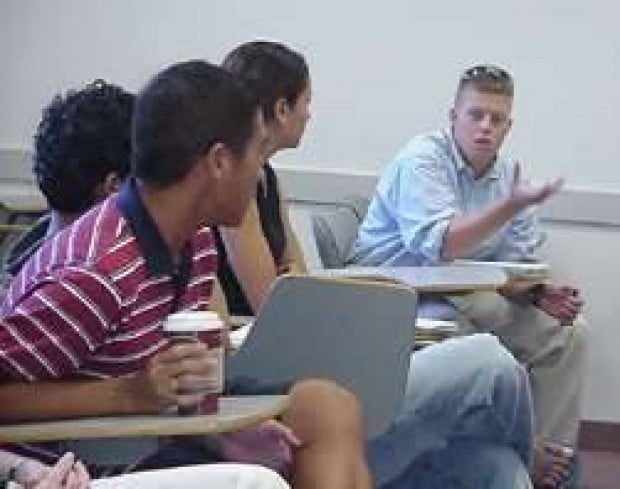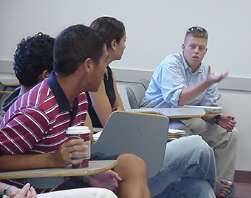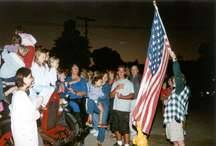Children and young adults are impacted by the tragedy that took place on Sept. 11 in a variety of way. Some wake up at night, fearful, others look for plausible answers, but they all see the world through new eyes now.
Adults who try to answer their concerns are also having difficulty understanding why it happened and what comes next.
Elementary
Young children divide matters into right or wrong, good or bad, while older children are able to think more abstractly.
Younger children like to help.
“A child who celebrated his 11th birthday party this weekend asked for money for the firefighters’ fund,” said Laura Rosenthal, Point Dume Marine Science Elementary School PTA president and clinical psychologist who has two young sons. Another gave all his allowance to the fund.
Webster Elementary school officials decided it would be best to shelter the children, not to discuss the events of that tragic morning. These events should be discussed at home with family members instead, said school officials.
“Our first response was to try and make the school calm that day as the events were happening,” said Phil Cott, principal at Webster Elementary School. “We had all TVs and radios off.
“We didn’t want to pass rumors and did not want to spend a whole great deal of time talking about it that day,” said Cott.
Instead, the school focused on doing something positive. To help the victims, Webster organized a fundraising drive for the firefighters’ families in New York.
Issues of discrimination have not been brought up at Webster, but school officials are on the look-out for it. If it did happen, “I would resolve a conflict like that on a case-to-case basis,” said Cott.
The principal’s primary concern for children is the impact of exposure. “Just like myself, I’m having trouble believing my eyes,” he said. “So for a child, it must be impossible to understand the magnitude. A child has trouble dealing with the death of one person. How can they possibly be expected to appreciate the enormity of this event?”
Exemplifying Cott’s statement, Rosenthal recalled: “A 6-year-old child thought they blew up the World Trade Center because they wanted the tallest building in the world.
“I think that most parents are very cognoscente about the need for young children not to get overloaded with information,” said Rosenthal. Instead, it is important to answer honestly, but simply, she said.
Secondary
Malibu High took a moment to solemnly stop all activities on campus Friday, in remembrance of those who died in New York, Washington and Pennsylvania.
But on Sept. 11 the high school did not have any TVs on either.
“We went through disasters before and we have learned from that not to have the TVs on,” said Mike Matthews, Malibu High principal. “It does nothing but inflame the emotions that are going on.”
Children spanning in ages from 12 to 18 react differently to the tragedy. Matthews noted that 6th and 7th graders reacted with fascination, while 8th through 10th graders had a whole lot of anger along with the fascination. “Eleventh and twelfth graders are more serious. They try to analyze what happened and what the U.S. response should be,” said Matthews.
Generally, teenagers have a desire to keep things as normal as possible and Malibu High continued classes and game practices as scheduled.
Teenagers can also have difficulty fathoming the reality of this event because it is so similar to what they see in movies. Parents should talk with their teens about the reality of this event, said Matthews.
Overall, however, the tragic events have helped children of all ages understand that they are part of a bigger picture, one that is national and global, he said.
In an effort to prevent any racial or religious harassment, Matthews asked the history teachers to talk about the Oklahoma bombing and Pearl Harbor. “After the Oklahoma City bombing everyone wanted to assume that it was the Arabs, but it wasn’t,” he said.
College
Pepperdine University students, as they shared their feelings about terrorism, went deeper into the equation; they discussed the matters in an international organization and law class on Friday.
Under the mediating eye of Dr. Robert Williams, professor of political science, students Marcus Mask, Gabriela Guzman, Neal Murata, Kimberly Cates and a few of their classmates pondered over the complicated international political scene that has now become more of a reality.
“Right now, the event is perceived as the first war act of the 21st century,” began Williams.
“I was very angry on Tuesday,” said Cates, “but seeing how the international community supports us made me feel better. It’s us against a few.”
The question of America’s involvement in other countries, especially the Middle East, was also discussed.
“It’s another ironic situation where we find ourselves on the verge of war with governments we helped implant,” commented Williams, as the class spoke about Afghanistan and Osama Bin Laden, the individual thought to be the mastermind behind the attacks.
While the U.S. helped the country fight the USSR in the 1980s and supported Bin Laden’s efforts to rid Afghanistan of the Russians, now the tables are turned.
“He’s mocking us,” commented a student.
But Pakistan is in an awkward situation also. “If they help the U.S., they risk radicalizing some fractions of the population, and it’s not in the U.S.’s best interest to destabilize this fragile government,” said Williams.
“Who is the war against? It’s fuzzy,” said a student.
The effectiveness of war was questioned because the enemy is so elusive.
“I don’t think our country is thinking clearly enough to respond right now,” said a student. “We should back track and be rational,” he said, “or we will cause more problems for ourselves.”
Students also expressed anger over the pictures they have seen of Palestinians celebrating the bombings. “We’re going to have some hardened hearts because of that,” said Cates.
Cates, who wants to be a peace negotiator, said: “For the first time in my life, if asked to join the army, I’d volunteer.”



